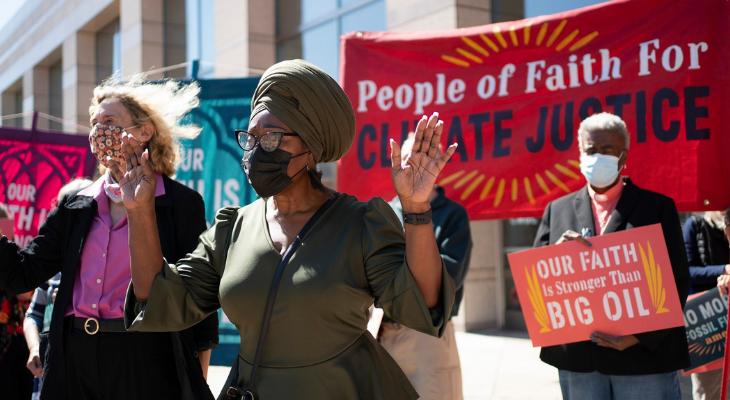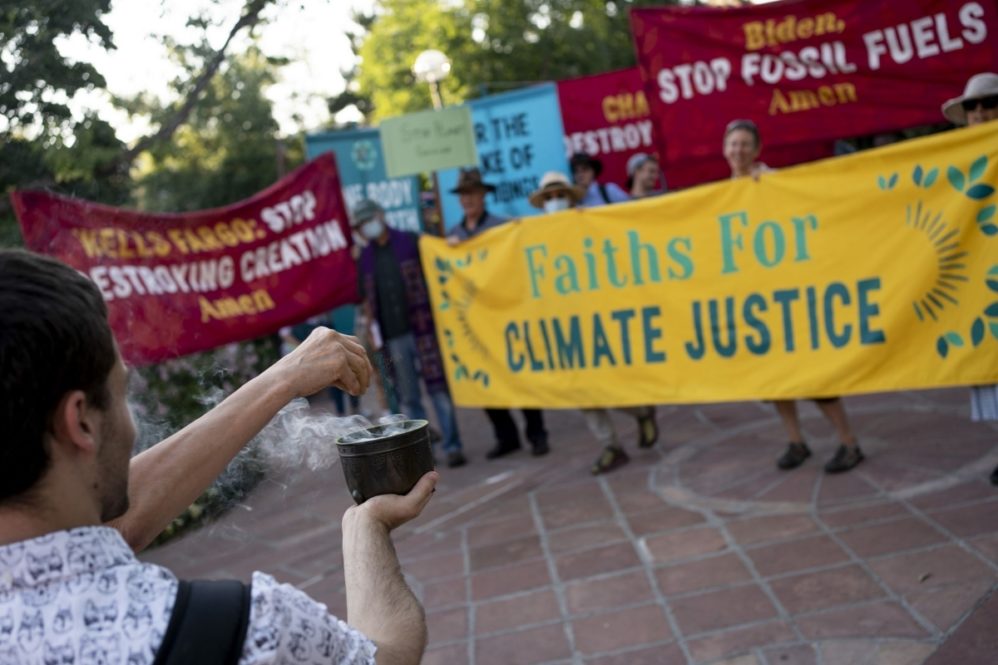Should Earth Day Be a Day of Prayer? The GreenFaith Movement Says Yes
April 21, 2022

On April 22 every year, millions of people around the world come together to celebrate Earth Day, engaging in weeklong activities focused on environmental conservation. From cleaning beaches and planting trees to organizing prayer circles for the Earth, there are a myriad of ways people honor nature during this time.
The celebration traces its origin back to 1969, when Gaylord Nelson, a junior senator from Wisconsin, decided to act after witnessing the ravages of a massive oil spill in Santa Barbara, California. Inspired by the student anti-war protests, Nelson rallied support from college campuses across the country to promote events aimed at raising public consciousness about air and water pollution. Their efforts led to the first Earth Day celebration in 1970, which inspired 20 million Americans to take to the streets, parks, and auditoriums to demonstrate against the impacts of 150 years of industrial development on the environment.
Today, the movement is an organization called EARTHDAY.ORG, which works with 150,000 partners globally, including universities, faith groups, and grassroot organizations, to diversify, educate and activate the environmental movement worldwide. This year, they are hosting an Interfaith Celebration of Earth Day with GreenFaith, a New Jersey-based nonprofit, which began in 1992 as a movement to support environmental stewardship by people of faith.
“We do that through education and training, organizing in GreenFaith circles, mobilizing in days of action … understanding that people who are at the grassroots are really the people who have the wisdom and knowledge to respond to issues like climate and environmental injustice,” says Rev. abby mohaupt, Director of Education and Training at GreenFaith. “We operate from this belief that people of all faiths share a belief that it’s time to act boldly in favor of the planet and all people.”
The event will bring together diverse global faith leaders to offer reflections and prayers for peace with the and within the planet, in light of the war in Ukraine, and the ongoing environmental crises like wildfires, climate change, global food and commodity shortages, and other global issues.
Share
Related Articles
American Civic Life
We Commemorate, We Commit: Out of Catastrophe, a Conversation on Connection and Repair
American Civic Life
American Civic Life
Faith Based Efforts Work in Vaccine Uptake: Now Let’s Make it Easy

Photo courtesy of GreenFaith
Attendees will also be invited to sign the fossil-fuel non-proliferation treaty, which is a multi-faith letter calling for 100% renewable energy for all, millions of green jobs, and an end to fossil fuels.
In an email invitation sent out to GreenFaith network to attend the event, mohaupt writes, “As people of faith and conscience, we each have power and a responsibility to do what’s right. When we come together, we can create a just, sustainable future. One full of the hope that’s so desperately needed.”
In addition to Earth Day, this spring brought with it a rare gift: a convergence of interfaith religious holy days, some of which are rooted in the celebration of spring and nature. To commemorate this unique spring of hope in a time of crises, GreenFaith is also hosting a campaign called Sacred Season for Climate Change — inviting their religious partners around the globe to offer messages, reflections, prayers, sacred rituals, and host events to talk about climate change.
“We’re creating a larger library of Interfaith resources on climate and environmental justice,” mohaupt says. “The goal is to deepen our faith commitments, particularly around climate justice. So, really getting clear about what is it in each of our traditions that calls us into this work and sustains us in the work.”
The campaign runs from March 17 to May 6, and so far, has 15 global partners and 47 official events being held across the globe, like Meditation with the Earth in Colorado and an Earth Day Hike in Massachusetts, to a Tree Planting in Faith-based Areas in Tanzania.
The response to the campaign has been overwhelmingly positive, mohaupt says, and many people are looking for guidance on how to sustain themselves in a time of uncertainty.
“In a time of deep climate crisis, we can’t love each other if we are not trying to stop something that’s causing deep suffering,” mohaupt says. “So, trying to live out that love through working for climate justice has been a huge part of my faith incentive — this is who I believe God’s calling me to be.”
If you’re interested in submitting to the GreenFaith interfaith resource on climate and environmental justice, you can do so here.



